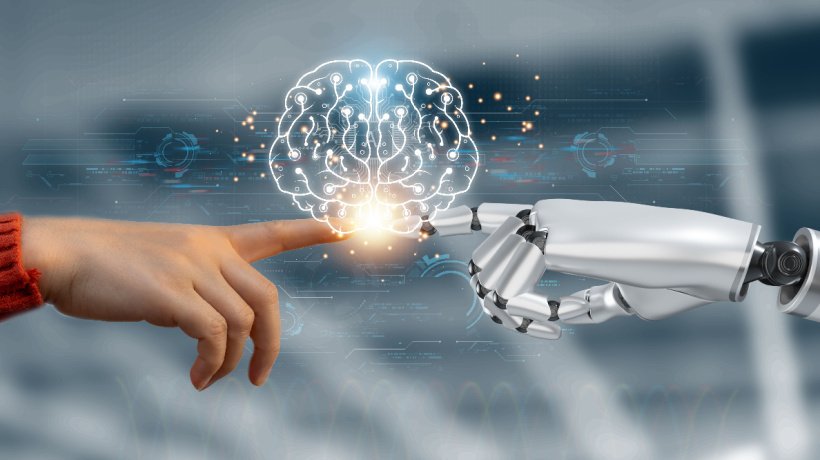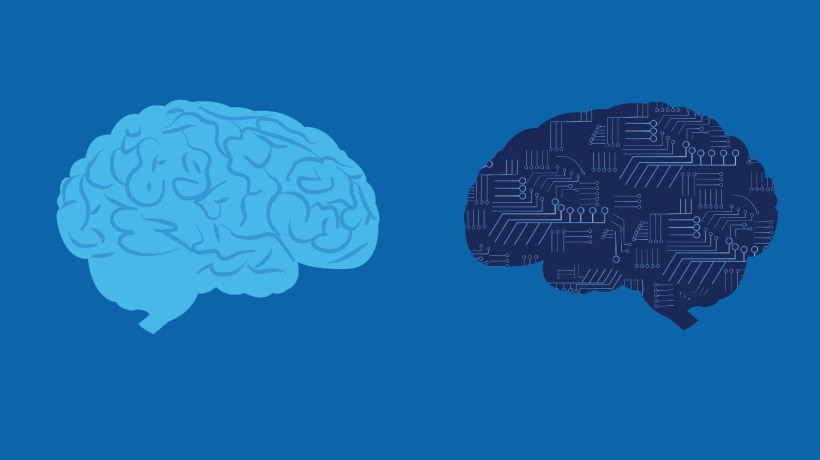The Evolution Of Instructional Design In The AI Era
In the dynamic world of corporate Learning and Development (L&D), Instructional Designers are under constant pressure to create training programs that are effective and agile enough to meet evolving business needs. Artificial Intelligence (AI) is emerging as a game-changer, empowering the evolution of Instructional Design in the AI era.
At CommLab India, we've integrated AI to transform traditional Instructional Design into innovative, efficient processes. This article delves into practical strategies, supported by insights from leading sources such as McKinsey, to help you harness AI while positioning yourself as a thought leader in corporate L&D.
From Traditional To AI-Enhanced Approaches
Instructional Design has come a long way from rigid, one-size-fits-all modules reliant on manual storyboarding and static content. Today, AI introduces dynamic elements that adapt in real time to learner behaviors and organizational goals.
This shift is driven by the need for speed in corporate environments, where skills become obsolete quickly due to technological advancements. Traditional methods often prove costly and ineffective, failing to keep pace with rapid changes, but AI helps Instructional Designers focus on strategy rather than routine tasks.
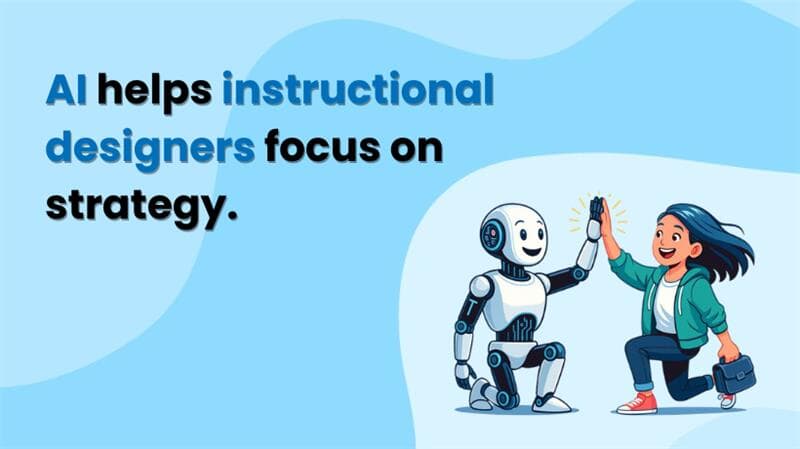
Image by CommLab India
In corporate settings, this evolution means transitioning from lengthy development cycles to rapid eLearning solutions that can be deployed in weeks, not months.
For instance, AI tools can automate content outlining, reducing the time Instructional Designers spend on initial drafts by up to 50%. This allows L&D teams to respond swiftly to business shifts, such as new product launches or regulatory changes, ensuring training remains relevant and impactful.
The Role Of AI In Reskilling The Workforce
Reskilling has become a strategic priority for organizations navigating the AI age. As roles evolve, companies must invest in upskilling employees to leverage AI effectively, fostering a culture of continuous learning. McKinsey's research highlights that employees are more ready for AI than leaders realize, with many already using it daily, yet formal training lags behind. [1]
Instructional Designers play a pivotal role here, using AI to identify skill gaps and design targeted programs that align with corporate objectives.
At CommLab India, we see AI as a catalyst for reskilling, enabling rapid eLearning solutions that incorporate generative AI for hands-on practice. This not only boosts productivity but also enhances employee motivation by making learning more interactive and relevant to daily workflows.
AI For Content Generation And Curation
Simplifying Content Creation
AI revolutionizes content creation by generating high-quality drafts, scripts, visuals, and even interactive elements at unprecedented speeds. In traditional setups, creating training materials could take weeks, but AI cuts this down significantly, addressing the inefficiencies of outdated methods.
For corporate L&D, this means developing rapid eLearning solutions that adapt to business priorities without extensive rework, saving both time and resources.
Generative AI tools can:
- Summarize vast amounts of data
- Curate relevant resources
- Suggest multimedia integrations
This allows Instructional Designers to iterate quickly. This efficiency is crucial in industrial sectors where training needs to evolve with market demands.
Practical Tools And Tips
Start with accessible tools such as ChatGPT for brainstorming ideas or AI-powered platforms for content curation from internal databases. Fortune reports that large businesses are increasingly focusing on AI concepts in training, with 70% emphasizing terminology and practical applications. [2]
A key tip: Use AI to generate initial content, but always apply human review to ensure cultural fit and accuracy. Integrate prompts that align with learning objectives, such as "Create a module on compliance training with real-world scenarios."
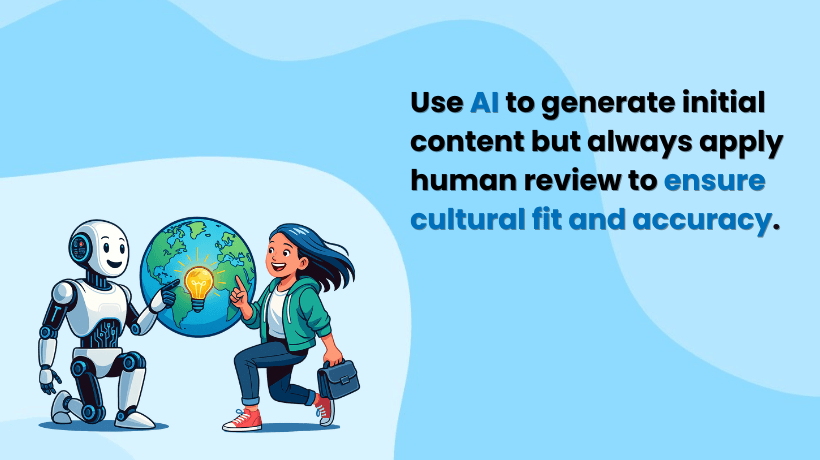
Image by CommLab India
At CommLab India, our rapid eLearning solutions incorporate these tools to produce customized content, blending AI efficiency with expert insights for optimal results.
Overcoming Common Challenges
While AI streamlines creation, challenges such as ensuring originality and avoiding generic outputs persist. Instructional Designers should be trained in prompt engineering to refine AI responses.
Additionally, integrating AI with existing LMS platforms can require initial setup, but the long-term gains in scalability outweigh this. By addressing these hurdles, L&D professionals can fully capitalize on AI for more engaging, effective training materials.
Personalizing Learning Experiences With AI
Adaptive Learning Paths
Personalization is where AI truly shines, analyzing learner data to create tailored paths based on performance, preferences, and pace. This adaptive approach ensures employees receive content that's relevant, reducing dropout rates and improving knowledge retention.
In corporate training, adaptive paths can adjust for roles, such as providing advanced modules for managers while offering basics for entry-level staff.
AI algorithms predict learning trajectories, recommending resources proactively. This not only accelerates skill acquisition but also aligns training with individual career goals, fostering a motivated workforce.
Data-Driven Insights
AI acts as a powerful analytics engine, uncovering patterns in learner data that highlight common challenges or emerging trends. For example, if data shows a team struggling with digital tools, AI can flag this for targeted interventions.
McKinsey notes that while nearly all employees are familiar with generative AI, yet only half receive formal training, underscoring the need for data-driven personalization. [3]
Practical integration involves embedding AI analytics into your LMS for real-time dashboards. CommLab India's rapid eLearning solutions leverage this to deliver hyper-personalized programs that drive measurable business outcomes.
Benefits For Employee Engagement And Retention
Personalized learning boosts engagement by making training feel relevant and achievable, leading to higher completion rates and better application on the job. Studies show that AI-enhanced personalization can increase retention by addressing individual needs, reducing turnover in competitive markets. For L&D leaders, this translates to stronger ROI, as engaged employees contribute more effectively to organizational goals.
AI-Driven Assessments And Feedback
Automated Evaluation
AI elevates assessments beyond basic quizzes, using Natural Language Processing to evaluate complex responses such as essays or simulations. This goes further than traditional LMS automation, providing deeper insights into learner comprehension.
In corporate L&D, automated evaluations scale to large workforces, ensuring consistent, objective grading tied to performance metrics.
Real-Time Feedback Mechanisms
Instant feedback is a hallmark of AI, offering constructive guidance that reinforces learning immediately. If an employee errs in a simulation, AI can suggest corrections and additional resources on the spot. This real-time loop enhances skill mastery and confidence.
Integrating AI With Human Oversight
To maximize effectiveness, combine AI feedback with human elements, such as mentor reviews for nuanced areas. This hybrid approach ensures feedback is timely, empathetic, and aligned with company culture. At CommLab India, our AI tools in rapid eLearning incorporate this balance for comprehensive assessments.
Ethical Considerations In AI-Enhanced Instructional Design
Bias And Fairness
AI systems can inadvertently perpetuate biases from training data, leading to unfair outcomes in assessments or recommendations. Instructional Designers must audit algorithms regularly, using diverse datasets to promote equity in corporate training.
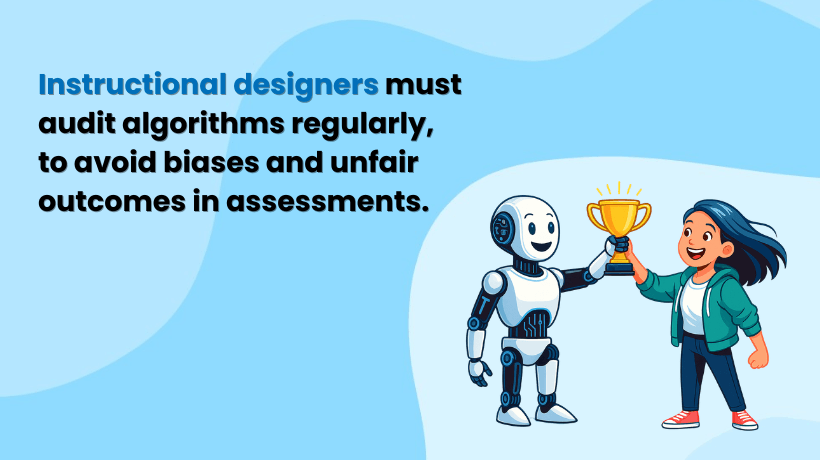
Image by CommLab India
Privacy And Transparency
Protecting employee data is paramount, and AI must comply with regulations such as GDPR. Transparency involves explaining how AI decisions are made, building trust. Clear policies on data usage prevent misuse and encourage adoption.
Building An Ethical Framework For L&D
Develop a framework that includes ongoing training on AI ethics, regular audits, and stakeholder involvement. This ensures AI enhances rather than undermines corporate values. CommLab India prioritizes such frameworks in our rapid eLearning solutions.
Real-World Examples Αnd Case Studies
Corporate L&D Success Stories
Fortune 500 companies are pioneering AI in training.
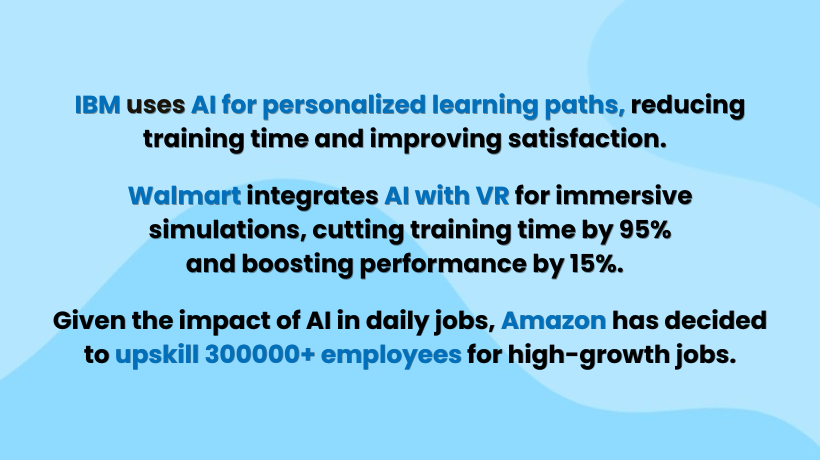
Image by CommLab India
These examples [4] [5] [6] mirror CommLab India's successes, where AI has reduced development time by 50% for clients, delivering rapid eLearning that drives results.
Future Trends Αnd Best Practices
Emerging Technologies
Looking to 2026, AI will converge with VR and AR for hyper-immersive training, predicting needs through advanced analytics. Trends include AI teaching assistants that reduce administrative loads, allowing L&D to focus on strategy.
Integrating AI Sustainably
Adopt best practices such as starting small, providing team training, and iterating based on feedback. Sustainability involves ethical integration and continuous upskilling.
Measuring ROI Ιn AI-Enhanced Training
Track metrics such as completion rates, skill uplift, and business impact to justify AI investments. McKinsey's surveys show organizations rewiring for AI capture significant value through such measurements. [1] CommLab India uses these to optimize rapid eLearning solutions.
Lastly…
AI in Instructional Design is fundamentally reshaping corporate L&D, delivering greater efficiency, deeper personalization, and innovative learning experiences. By adopting these practices thoughtfully, you can lead transformative training initiatives. Ready to elevate your programs? Contact CommLab India for training or inquiries on AI-enhanced rapid eLearning solutions. We're here to help you succeed.
References:
[1] Superagency in the workplace: Empowering people to unlock AI's full potential
[2] Here's how AI will impact HR—and the training blind spot that companies are missing
[3] We're all techies now: Digital skill building for the future
[4] Reskilling your workforce in the time of AI
[5] Case Studies: Successful AI Adoption In Corporate Training
[6] Amazon Embraces AI and Robotics to Enhance Worker Experience





